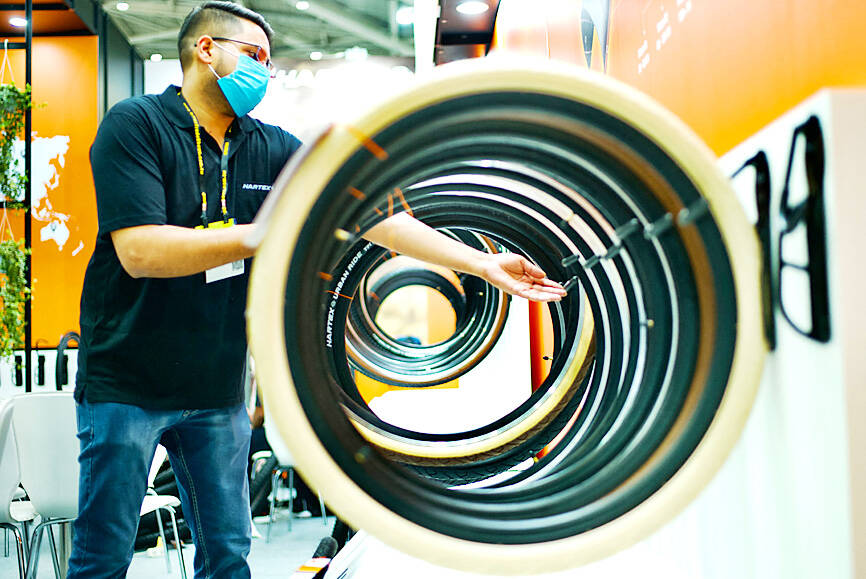The government’s business climate monitor last month signaled “blue” for the fourth consecutive month, indicating a recession, as global inflation and monetary tightening continued to constrain exports and other key economic barometers, the National Development Council said yesterday.
The total score for the nine monitoring indicators shed 1 point to 10, the lowest in 14 years, which indicates that the economy is unlikely to improve in the first half of the year amid an ongoing global economic slowdown, council research director Wu Ming-huei (吳明蕙) said.
“Poor exports are to blame,” Wu told a news conference in Taipei.

Photo: AFP
The outlook for exports, which accounts for 60 percent of GDP, appears dim due to weak end-market demand in the US and Europe, she said.
Taiwan is home to the world’s largest contract makers of electronics used in smartphones, notebook computers, TVs, wearable electronics, vehicles, servers, and Internet of Things and artificial intelligence applications.
Slack demand would not only limit exports, but also negatively affect sales prices and industrial output, Wu said.
The council uses a five-color system to portray the nation’s economic health, with “green” signifying steady growth, “red” suggesting a boom and “blue” reflecting a recession. Dual colors suggest a transition to a stronger or weaker state.
The monitor is likely to remain “blue” for a few more months, with a value of 10 expected for this month, Wu said.
The Directorate-General of Budget, Accounting and Statistics (DGBAS) forecasts export contraction through the third quarter, meaning that the chances of a quick recovery are small, she said.
The index of leading indicators, which seeks to project the economic situation in the coming six months, grew 1.17 percent to 100.95, rising for the fourth straight month on the back of better export orders, business confidence, construction floor areas, stock closing prices and labor accession rates, the council said.
However, the readings on money supply and imports of semiconductor equipment continued to display negative cyclical movements, it said.
The index of coincident indicators, which aims to measure the current economic situation, fell another 1.92 percent to 90.13, dragged by listless exports, industrial output, commercial sales and electricity usage, it said.
Improvement in the coincident index series is necessary for the council to judge whether the economy has bottomed out and is starting to recover, Wu said.
Leading indicators mainly reflect better business expectations on the part of corporations, while coincident data indicate solid economic upturns, she said.

Taiwan Semiconductor Manufacturing Co (TSMC, 台積電) last week recorded an increase in the number of shareholders to the highest in almost eight months, despite its share price falling 3.38 percent from the previous week, Taiwan Stock Exchange data released on Saturday showed. As of Friday, TSMC had 1.88 million shareholders, the most since the week of April 25 and an increase of 31,870 from the previous week, the data showed. The number of shareholders jumped despite a drop of NT$50 (US$1.59), or 3.38 percent, in TSMC’s share price from a week earlier to NT$1,430, as investors took profits from their earlier gains

In a high-security Shenzhen laboratory, Chinese scientists have built what Washington has spent years trying to prevent: a prototype of a machine capable of producing the cutting-edge semiconductor chips that power artificial intelligence (AI), smartphones and weapons central to Western military dominance, Reuters has learned. Completed early this year and undergoing testing, the prototype fills nearly an entire factory floor. It was built by a team of former engineers from Dutch semiconductor giant ASML who reverse-engineered the company’s extreme ultraviolet lithography (EUV) machines, according to two people with knowledge of the project. EUV machines sit at the heart of a technological Cold

TAIWAN VALUE CHAIN: Foxtron is to fully own Luxgen following the transaction and it plans to launch a new electric model, the Foxtron Bria, in Taiwan next year Yulon Motor Co (裕隆汽車) yesterday said that its board of directors approved the disposal of its electric vehicle (EV) unit, Luxgen Motor Co (納智捷汽車), to Foxtron Vehicle Technologies Co (鴻華先進) for NT$787.6 million (US$24.98 million). Foxtron, a half-half joint venture between Yulon affiliate Hua-Chuang Automobile Information Technical Center Co (華創車電) and Hon Hai Precision Industry Co (鴻海精密), expects to wrap up the deal in the first quarter of next year. Foxtron would fully own Luxgen following the transaction, including five car distributing companies, outlets and all employees. The deal is subject to the approval of the Fair Trade Commission, Foxtron said. “Foxtron will be

INFLATION CONSIDERATION: The BOJ governor said that it would ‘keep making appropriate decisions’ and would adjust depending on the economy and prices The Bank of Japan (BOJ) yesterday raised its benchmark interest rate to the highest in 30 years and said more increases are in the pipeline if conditions allow, in a sign of growing conviction that it can attain the stable inflation target it has pursued for more than a decade. Bank of Japan Governor Kazuo Ueda’s policy board increased the rate by 0.2 percentage points to 0.75 percent, in a unanimous decision, the bank said in a statement. The central bank cited the rising likelihood of its economic outlook being realized. The rate change was expected by all 50 economists surveyed by Bloomberg. The